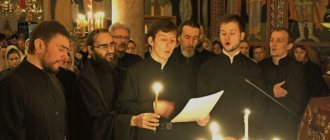Why do they sing in the temple?
Church singing is not just singing prayers with or without music.
This concept refers to a whole set of knowledge that each choir member must acquire during the learning process in order to sing meaningfully, sensitively and competently.
Learning to perform in the temple is not just notes, a program and a methodology.
This also includes learning the intricacies of the services held in the church, studying the Old Church Slavonic language (it is in this language that most texts are written), and becoming familiar with prayers.
Important! What does a nativity scene look like and what is it?
Most often, those people who already have a musical education or are endowed with incomparable talent from God fall into the ranks of churchmen, and they are given vocals as a matter of course.
In such cases, learning musical notation will not become an obstacle on the way - after all, if something is given, then the theory will follow by itself.
Recently, the issue of spirituality has become more relevant for Russian people, so many people want to join Sunday schools. We immediately draw your attention to the fact that such institutions have different starting requirements for applicants.
There are those who accept everyone, it is only important to have hearing and a sense of rhythm. They offer a short course in solfeggio and practical playing of an instrument (most often the piano). Others do not accept people without musical education (at least you need to graduate from the appropriate school).
Interesting! Schedule of services in the Church of St. Andrei Rublev
Choosing a place to study
Let's find out what church singing courses currently exist in Moscow, and under what conditions they accept new participants into their ranks.
- Krutitskoe Compound, Church of the Resurrection of the Word. We are recruiting people aged 18 to 50 years. Students are divided into groups: those with a musical education and those without. The first undergo training for one year, during which they will study the structure of the liturgy and all-night vigil. The basics of musical literacy are taught to beginners. People are accepted after auditions, which take place every Sunday. Upon completion, a certificate is issued.
- Church of the Three Saints on Kulishki, Regency Courses. Those wishing to enter here must meet three conditions: musical education, the blessing of a confessor, and a year of practice in participating in the choir.
- School of church singing at the Orthodox. The organization was founded in 2004 and is designed to train adults of all skill levels. You can get the necessary skills here for free, and upon completion of the course you will be issued a certificate.
Note! The peculiarity of church singing is that it can be either polyphonic (polyphonic) or single-voiced (unison). The first option has to do with the Russian Orthodox Church. All worship services in our culture are conducted with a choir performing three or four parts simultaneously.
In the Western branch of Orthodox Christianity, that is, in the Byzantine and Greek churches, unison singing is more common. Courses of performance in the Byzantine style, that is, in unison, can be taken at the School of Byzantine Chant. Located in the building of the publishing council of the Russian Orthodox Church on the 4th floor.
Studying here lasts from one to three years, depending on the initial preparation of the applicant. It offers free training in church singing, as well as learning the basics of musical literacy and Greek church syllable.
This is interesting! All information about the Cherepovets diocese
It is worth noting that the principle of singing according to the Byzantine pattern is fundamentally different from the Russian one. The difference lies not only in unison and the lack of polyphony, but also in the texts themselves, as well as in the music. In Moscow, this is the only place where names are taught in this manner of church chant.
Sections and centers of choral singing in Moscow
Bebeshka.info » Education in Moscow » Sections and centers of choral singing
Find choral sections and centers near me
Sort by rating
by name
1
Hi music!
- Semenovskaya Square, 7, bldg. 17A, floor 3
- +7 (968) 5…Show phone
- daily, 10:00–22:00
- View on map
Headings
: Music schools, Sections and centers of choral singing
Musica Linguae
- Ostozhenka street, 38
- +7 (916) 6…Show phone
- Tue-Thu 18:30–21:30; Sat 12:00–17:00
- View on map
Headings
: Sections and centers of choral singing
Sonore
- Angelov Lane, 6, bldg. 2, ground floor
- +7 (985) 4…Show phone
- daily, 10:00–21:00
- View on map
Headings
: Master classes for children, Music schools, Sections and centers of choral singing
Academic male choir MEPhI National Research Nuclear University
- Kashirskoe highway, 31
- +7 (495) 7…Show phone
- daily, 10:00–18:00
- View on map
Headings
: Sections and centers of choral singing
Academic Choir of the Atom Club
- Marshal Tukhachevsky street, 20, building 2
- +7 (916) 4…Show phone
- Wed 17:30–19:00; Sat 11:00–12:30
- View on map
Headings
: Music schools, Sections and centers of choral singing
Cossack song and dance ensemble Russian Will
- Beskudnikovsky Boulevard, 52A
- +7 (925) 0…Show phone
- daily, around the clock
- View on map
Headings
: Sections and centers of choral singing
Cossack song ensemble People Free
- Maly Ivanovsky Lane, 4
- +7 (909) 9…Show phone
- daily, around the clock
- View on map
Headings
: Sections and centers of choral singing
Song and Dance Ensemble of the Russian Aerospace Forces
- Pavlovskaya street, 8
- +7 (495) 9…Show phone
- Mon-Fri 09:00–18:00
- View on map
Headings
: Sections and centers of choral singing
Ensemble of soloists of the Moscow Choral Theater Boris Pevzner
- Pushechnaya street, 4с2
- daily, 10:00–18:00
- View on map
Headings
: Theatres, Sections and choral singing centers
Big Children's Choir named after. Popova
- Degtyarny Lane, 7
- +7 (495) 9…Show phone
- Tue, Fri 16:00–19:30; Sun 10:00–15:00
- View on map
Headings
: Training centers for additional education, Sections and centers for choral singing
Vocal studio
- Staropetrovsky proezd, 1, building 2, Baby Store shopping center
- +7 (985) 1…Show phone
- daily, 08:00–23:30
- View on map
Headings
: Music schools, Sections and centers of choral singing
Vocal studio of Dmitry Popov
- Miklouho-Maklaya street, 18, bldg. 2
- +7 (985) 1…Show phone
- daily, 09:00–22:00
- View on map
Headings
: Music schools, Sections and centers of choral singing
Vocal studio Our children in Maryino
- Bratislavskaya street, 26, floor 2
- +7 (925) 9…Show phone
- Tue, Thu 16:00–19:00
- View on map
Headings
: Children's camps, sanatoriums, Music schools, Sections and centers of choral singing
GBUDO Moscow Mgodshi Sokolniki, structural unit of Children's Music School named after. M.L.Rostropovich
- Chusovskaya street, 7, bldg. 1
- +7 (495) 4…Show phone
- daily, 10:00–20:00
- View on map
Headings
: Music schools, Sections and centers of choral singing
State Academic Symphony Chapel of Russia
- Pyatnitskaya street, 2/38с1
- +7 (495) 9…Show phone
- Mon-Fri 11:00–17:00
- View on map
Headings
: Sections and centers of choral singing
Moscow State Chapel named after Vadim Sudakov
- Klara Zetkin street, 4, bldg. 2
- +7 (926) 1…Show phone
- Mon-Fri 10:00–18:00, break 14:00–15:00
- View on map
Headings
: Theatres, Sections and choral singing centers
Children's music school named after. B. V. Asafieva
- Yasenevaya street, 33k2, Orthodox gymnasium of Seraphim of Sarov
- +7 (499) 6…Show phone
- Mon-Fri 12:00–20:00
- View on map
Headings
: Music schools, Sections and centers of choral singing
Children's music school named after A.F. Gedike
- Boytsovaya street, 14, bldg. 7A
- +7 (499) 1…Show phone
- Mon-Sat 09:00–21:00
- View on map
Headings
: Training centers for additional education, Music schools, Sections and centers of choral singing
Children's choir studio Vesnyanka
- Ogorodnaya Sloboda lane, 6, building 1
- +7 (495) 6…Show phone
- Mon-Fri 10:00–19:00
- View on map
Headings
: Training centers for additional education, Sections and centers for choral singing
Breath of sound
- 3rd Mytishchinskaya street, 3, building 1, Auditorium 613A
- +7 (916) 4…Show phone
- daily, 08:00–23:00
- View on map
Headings
: Music schools, Sections and centers of choral singing, Dance schools for children
Chamber choir of MIREA - Russian Technological University
- Vernadsky Avenue, 86с1
- +7 (926) 2…Show phone
- Tue-Thu 18:00–22:00
- View on map
Headings
: Sections and centers of choral singing
Amateur folk choir Horosapiens Folk”
- Tokmakov lane, 21/2с1
- +7 (985) 1…Show phone
- daily, around the clock
- View on map
Headings
: Sections and centers of choral singing
Moscow Cossack Choir
- Beskudnikovsky Boulevard, 52A
- +7 (926) 5…Show phone
- daily, around the clock
- View on map
Headings
: Sections and centers of choral singing
Valery Rybin Male Choir
- Honey Lane, 3
- +7 (495) 5…Show phone
- Mon-Fri 10:00–18:00
- View on map
Headings
: Sections and centers of choral singing
Music school for adults Ekaterina Zaboronok
- Baumanskaya street, 16
- +7 (963) 6…Show phone
- daily, 10:00–23:00
- View on map
Headings
: Music schools, Sections and centers of choral singing
Music school for adults and children Virtuosos
- Teterinsky lane, 14, building 1
- +7 (495) 1…Show phone
- daily, 10:00–22:00
- View on map
Headings
: Master classes for children, Music schools, Sections and centers of choral singing
MultiCase
- Pistsovaya street, 7A
- +7 (926) 2…Show phone
- Mon-Fri 12:00–19:00
- View on map
Headings
: Sections and centers of choral singing
Patriarchal Choir of Danilov Monastery
- Danilovsky Val street, 22
- +7 (985) 3…Show phone
- daily, 07:00–20:00
- View on map
Headings
: Sections and centers of choral singing
Sing in the choir Horosapiens Classic Amateur choir
- Tokmakov lane, 21/2с1
- +7 (985) 1…Show phone
- daily, around the clock
- View on map
Headings
: Music schools, Sections and centers of choral singing
Rainbow
- Vostochnaya street, 4, bldg. 1st, 2nd floor, rooms 201, 204, 205
- +7 (926) 5…Show phone
- Tue, Fri, Sun 16:00–21:00
- View on map
Headings
: Music schools, Sections and centers of choral singing
St. Demetrius Orthodox Secondary School
- Leninsky Prospekt, 8, bldg. 12
- +7 (499) 7…Show phone
- View on map
Headings
: Secondary schools, Sections and centers of choral singing
TalanTa
- Gorki village, Turovskaya street, 5, residential complex City-Resort May
- +7 (964) 6…Show phone
- daily, 09:00–19:00
- View on map
Headings
: Music schools, Sections and centers of choral singing
Willie Winkie Song Theater
- Novoalekseevskaya street, 1, In the premises of Library No. 48
- +7 (926) 6…Show phone
- Tue, Wed, Fri 13:00–20:00
- View on map
Headings
: Music schools, Sections and centers of choral singing
Moscow Synodal Choir Foundation
- Bolshaya Ordynka street, 20, Temple
- +7 (967) 1…Show phone
- daily, 06:00–21:00
- View on map
Headings
: Sections and centers of choral singing
Choir Victoria
- Grimau street, 11A
- +7 (916) 6…Show phone
- Wed 18:00–21:00
- View on map
Headings
: Sections and centers of choral singing
Novospassky Monastery Choir
- Peasant Square, 10
- +7 (926) 6…Show phone
- daily, 08:00–20:00
- View on map
Headings
: Sections and centers of choral singing
Choir of the Sretensky Monastery
- Bolshaya Lubyanka street, 19
- +7 (926) 5…Show phone
- Mon-Fri 10:00–19:00
- View on map
Headings
: Sections and centers of choral singing
Choir Turkish
- Mira Avenue, 25с1
- +7 (499) 2…Show phone
- Mon-Fri 10:00–19:00
- View on map
Headings
: Sections and centers of choral singing
Financial University Choir
- Leningradsky Prospekt, 49
- +7 (926) 3…Show phone
- Tue, Thu 19:00–21:30
- View on map
Headings
: Sections and centers of choral singing
Center for Culture and Sports Izmailovo
- 6th Parkovaya Street, 19
- Mon-Fri 11:00–21:00; Sat 14:00–16:00
- View on map
Headings
: Sports sections, sports schools, Sections and choral singing centers, Children's development centers, Dance schools for children
1
List of choral singing centers in Moscow. Automatic search for nearby organizations. Addresses and telephone numbers, brief descriptions of establishments with operating hours and links to their official websites. For your convenience, all organizations are presented both on the map and in the form of a rating.
Briefly about the training program
Learning to sing prayers on your own is difficult, especially without the required musical training. For those who have graduated from music school, it is undoubtedly easier - all that remains is to train your voice, “sharpen” it for singing for the Divine Service and learn the language in which the repertoire will be performed.
Informative! What do they pray for to the icon of the Feodorovskaya Mother of God?
The program for condensed training in singing in the choir and in the choir:
We study notes, meters, beats, shades and strokes in music. We learn to sight read, not only by pressing certain keys, but also taking into account the strength and nature of the sound.- Let's get acquainted with solfeggio - this is the theoretical part of music. The methodology for studying it will be more simplified than in schools. During the lessons, students will learn what intervals, chords, modes are, what pauses there are and other points in the theoretical section.
- Vocals The basis of the basics, during which the voice is “stretched” with the help of special chanting exercises. They are aimed at both enhancing breathing and increasing the range of the voice.
- Studying the texts of church hymns. You need to memorize them not just by heart, but with an understanding of what they say, as well as in accordance with each note, which corresponds to its own syllable.
For beginners, the simplest texts of prayers are offered, consisting of several phrases that are repeated to various musical motives.
Interview with the director of the School of Sacred Singing N. D. Lebedeva
The soul grows in music Today, the School of Spiritual Singing of the Church of the Holy Martyr Tatiana at Moscow State University is a non-state institution of additional education. Children and adults study here, learning to sing in a church choir from the very beginning. Its director, Nina Dmitrievna Lebedeva, and the senior regent, director of the school’s concert choir, Sergei Yurievich Markelov, talk about the history of the School of Sacred Singing and their students.
— Nina Dmitrievna, tell us how the School of Sacred Singing appeared, who was at the origins of its creation?
Nina Lebedeva : Fifteen years ago, with the blessing and support of the rector of the church, Archpriest Maxim Kozlov, those who sang in the right choir of our church, on their own, opened a Sunday school for the children of parishioners. At first we studied with them in the choir and studied the Law of God. Musical and religious subjects were gradually added. However, it was clear that something was missing: after two or three years of school, upon reaching adolescence, the children left it. In other words, there was no unifying goal that both children and parents strived for. This is how we came up with the idea of creating a choral music school, in which children would learn to sing in the choir, receiving a professional primary music education. Sergei Markelov : I would like to draw your attention to the fact that before the revolution, the best musical education could be obtained under the Church, at the Synodal School. Of course, secular education also developed. However, from time immemorial in Russia there were two best choirs: the sovereign and the patriarchal choir of singing clerks. When, under Peter the Great, the sovereign's choir was transferred to St. Petersburg and became a court singing chapel, the patriarchal choir was assigned to the Synod and was practically ruined, which is why this choir was in decline for a long time. Only at the end of the 19th century was it revived, competing with the court choir that was then shining in Europe. This happened largely due to the mastery of the ancient liturgical tradition preserved in Moscow.
In Soviet times, several cultural figures adopted the ideas of church music singing education, thanks to which the Moscow Sveshnikov Choir School inherited part of the methods and pedagogical experience of the patriarchal choir. I am a graduate of this school and try to pass on the historical tradition to my students. I like working with children. As someone wise said, “find something that suits your heart, and you will never work a single day of your life.” That's how it works. Nina Lebedeva : To the usual subjects of state music schools, such as choir, solfeggio, musical literature and piano, we added those that, in our opinion, are necessary for teaching children to sing in the choir. This is the Law of God, church singing, Church Slavonic language, liturgics. Over the years, we have developed a system and training program, thanks to which children learn singing in the choir from the age of six, and after graduating from school after the eighth grade, our graduates have a full-fledged profession! But this is not the main thing. In addition to providing musical education and a profession, we are trying to bring the child into the church. Because everything that happens in the church - the speech of the priest, the texts of the readers, the course of the service itself - becomes understandable and familiar to children. By starting to sing in a church choir, they become involved in the service in the most effective way - by participating in it. Does the school only accept children from religious families? Nina Lebedeva : To enter our school, a recommendation from the child’s confessor or his parents is required. Although there are exceptions, if we see that a child is drawn to music and wants to learn. We also accept children from families whose members are baptized but do not go to church often.
Today, more than half of the students are children from outside our parish: parents find out about us and bring their children from other parts of the city. We also accept young people under 25 years of age without musical education - an adult level of singing training is open for them, designed for three years.
The workload at the School is very serious: lessons on Monday and Thursday from seven to half past ten, plus individual vocal and piano lessons, on Saturday there is an educational and therefore mandatory morning service, then solfeggio and choir classes, on Sunday - liturgics and choir.
What are the criteria for selecting students?
Nina Lebedeva: There are none. We are convinced that there is not a single child or adult who cannot be taught to sing. When an adult comes and says: “I don’t have a voice,” we answer: “You’re saying that, right? So there is a voice." We all have a voice and abilities that need to be helped to shine. As the confessor of our school, Father Maxim, often repeats: “he who wills is capable.” Who are your teachers?
Nina Lebedeva: Since the creation of the school, the staff has practically not changed. Of the 14 teachers, 12 are with higher education, the majority are practitioners, they sing in church or secular choirs, and are regents. They are amazing teachers. Each one works according to his own original method and works wonders in the lessons. How do school graduates use the acquired knowledge? Where are they waiting? Nina Lebedeva : Many people enter professional music schools. In particular, to the Moscow State Institute named after Schnittke: here our guys receive the profession of conductor. About ten percent sing in the choirs of Moscow, some act as regents. Of course, our graduates also work in the choir of the Tatyana Church.
Is it possible to see your students in major concerts, competitions, and festival programs?
Nina Lebedeva: Of course. We participate in the events of St. Tikhon's Humanitarian University, go to services, take part in liturgies and sing in churches in the capital. It has become a good tradition for our choir to travel to remote parishes near Moscow. Every year, under the leadership of the rector of the church, Father Maxim Kozlov, our students visit the Yakut, Kostroma, Altai and Moscow dioceses.
Since 2007, we have been taking part in Orthodox choir competitions, and since 2009, with the blessing of His Holiness the Patriarch and under the patronage of the Synodal Department for Relations between Church and Society, we have organized our annual choir festival “Cyril and Methodius”. It takes place in the vestibule of the Church of the Holy Martyr Tatiana at Moscow State University and brings together up to thirty choirs from different regions. Participants bring folk and patriotic songs, spiritual poems, and liturgical chants to the competition. The jury includes teachers from the Moscow Conservatory, the Institute named after. Gnesins, artistic director of the Moscow Synodal Choir A. A. Puzakov. The chairman of the jury is A. M. Rudnevsy, professor of the Moscow Conservatory, artistic director of the Kastalsky choir. And last year, a master class was held for jury members, which also attracted conductors of secular choirs, who were interested in learning how to work with a choir on church works. We were happy about this, because we are ready to share methods and best practices, and are open to contacts and cooperation.
Can sacred music education be an alternative to secular education?
Sergey Markelov: We see our main task as the need not just to teach how to perform something, but to instill and preserve a love of music and develop it. As for a secular school, parents often simply “pass” their child to a “music school.” He studies, hating everything connected with notes, and after graduation he solemnly burns his violin or cello, hides his diploma, and for many years or even decades is simply not able to return to music. To avoid this, you need to develop your soul. This is, perhaps, what I see as the task and idea of spiritual music education. An indicator that we are on the right path is that the children of our graduates come to our school, and they themselves often come to sing of their own free will. Every year our student choir becomes stronger and stronger. At Christmas and Easter we traditionally sing together with professionals, and today’s students are joined by more and more graduates of the School of Spiritual Singing of the Church of the Holy Martyr Tatiana at Moscow State University.
Author and photo: Daniil Afrin
Some useful tips
The basis of teaching this art is the so-called school of church singing called osmoglasie. The bottom line is that eight modes sound simultaneously in prayer, each of which has its own part. The overall sound turns out to be special and is associated by people exclusively with Theological motives.
This is interesting! Powerful Prayer for Worry, Fear and Anxiety
In order to master osmoharmony perfectly, it is necessary:
- Correctly determine your timbre and pitch of voice. Most people have a second soprano (middle timbre), men are more likely to sing altos, and rare women sing at the height of the first soprano.
- In the initial stages, listen to the “leaders” of the church choir.
- Try to hold your part during the performance of works, and not “float” between voices.
- Always highlight your part in the overall score and know it clearly.
Interesting to know! Many music schools provide a program for studying church chants for children who attend not only individual lessons in playing an instrument, but also a choir club. It is precisely such works that are the best exercise for the voice.
The most talented students of church singing schools can take training in singing in the choir. The choir is a hill in any church that has a mirror structure - it is located to the right and left of the altar. On the right side of the choir there are professional choristers, and on the left - amateurs.
In order to perform at services, you should regularly train and be able to not only hold your part in the choir, but also perform it with feeling, quality and expressiveness.
How to become a church choir director?
Regent means "ruling" in Latin. This is the name given to the leaders (conductors) of church choirs in the Russian Orthodox Church.
Currently, the demand for musicians capable of organizing or leading an already created church choir (choir) is very high. This is explained by the constant increase in the number of operating churches, parishes and dioceses of the Russian Orthodox Church. This article contains complete information on how to become a regent.
Church obedience
You can get into a church choir only with the blessing of the parish priest or the bishop heading the diocese (metropolis).
The regent, permanent choristers and charter director are paid a salary. Beginning choristers do not receive payment. Since the regent is responsible for the choir, all organizational issues are decided by him.
Regent's responsibilities:
- preparation for worship,
- choice of repertoire,
- conducting rehearsals (1-3 times a week),
- compiling a music archive,
- determination of the number and composition of the choir on weekdays and Sundays,
- distribution of parties,
- conducting during worship services,
- preparation for concert performances, etc.
If possible, a charter member is appointed to assist the regent. He is directly responsible for preparing the choir for daily church services, and in the absence of the regent he leads the choir.
How to become a regent?
The staff of any large church choir currently always includes professional musicians:
- graduates of the choral or conducting department of the university,
- students and teachers of a music college or music school,
- soloists, musicians, actors of philharmonic societies, theaters, etc.
However, due to the specific nature of singing in the choir, a secular musician cannot lead a church choir. This requires appropriate training and experience in the choir for at least 2-5 years.
The specialty “Church Choir Director” can be obtained while studying at regent (singing) schools (departments, courses). Below is a list of the most prominent educational institutions that train future regents.
Admission requirements
- Having a musical education, the ability to read music and sight sing are not mandatory, but highly desirable conditions for enrollment. In some educational institutions this is a mandatory criterion (see table). In any case, it is necessary to prepare for an audition that will determine the candidate's musical abilities.
- A priest's recommendation is required. Sometimes you can receive a blessing from a priest on the spot.
- In almost all theological educational institutions, upon admission it is necessary to undergo an interview, during which knowledge of basic Orthodox prayers and the Holy Scriptures (Old and New Testaments) is confirmed.
- Ability to read the Church Slavonic language, in which the vast majority of liturgical books are compiled.
- Priority for admission is given to singers, psalm-readers, and clergymen with choir obedience from 1 year.
- Certificate (diploma) of education (not lower than full secondary school).
- Ability to write a presentation correctly.
- Upon admission to some educational institutions, applicants are required to pass a conducting exam.
Education
The training time for psalmists (readers) and singers is usually 1 year or more. The training of regents takes at least 2 years.
During their studies, future regents receive both musical and spiritual education. In 2-4 years it is necessary to master the knowledge of church canons, liturgics, church life, liturgical regulations, and the Church Slavonic language.
The regency training program includes both general musical subjects and church disciplines (singing and general):
- church singing,
- everyday life of church singing of the Russian Orthodox Church,
- history of Russian sacred music,
- liturgics,
- catechism,
- liturgical regulations,
- comparative Theology,
- basics of Church Slavonic literacy,
- fundamentals of Orthodox doctrine,
- Bible story,
- Old and New Testament,
- solfeggio,
- harmony,
- conducting,
- music theory,
- reading choral scores,
- choir dance,
- piano,
- arrangement.
During their studies, cadets undergo mandatory liturgical practice in the choir in the churches of the Russian Orthodox Church.
Russian educational institutions where they train regents and choristers
Data on such educational institutions are clearly presented in the table - SEE TABLE
Let's sum it up
Sunday school can be your first step into the science of learning church singing. In it you can gain invaluable knowledge in the field of spirituality, as well as learn a lot of new things about music and its components.
Such institutions help you learn the most holy language - Old Church Slavonic, as well as “stretch” your voice the same way you stretch your muscles in the gym. There are many schools of church singing, both in Moscow and in other cities of Russia. Choose the one you like and go there for new experiences.









